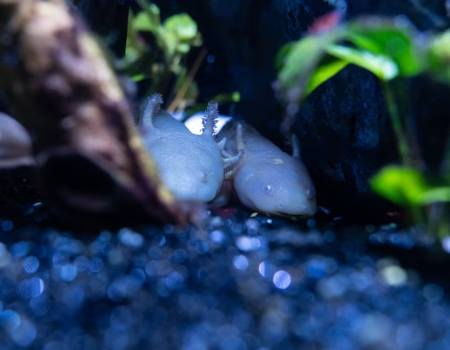Are Axolotls Legal or Illegal in New Hampshire? Everything You Need to Know
You love axolotls. They’re cute, quirky, and make fascinating pets. But before you think about bringing one home, you might be wondering if they’re allowed in New Hampshire.
Some states have strict laws about keeping exotic pets, and axolotls often end up on those lists. The last thing you want is to get attached to one and then find out it’s not legal.
Good news—axolotls are legal in New Hampshire. But that doesn’t mean there are no rules. Let’s go over what you need to know so you can keep your axolotl without any trouble.
Axolotl Laws in New Hampshire

New Hampshire allows axolotls as pets, but there are some things to keep in mind. State laws focus on protecting native wildlife and preventing invasive species, and axolotls don’t naturally exist in New Hampshire’s ecosystems. That means they don’t pose the same risks as some other exotic species.
In their natural habitat, axolotls typically live around 5 to 6 years, significantly shorter than their lifespan in captivity.
However, the state still follows aquatic pet regulations to prevent environmental issues. If you’re bringing an axolotl into the state or planning to breed them, you should know how these rules apply. While New Hampshire isn’t as strict as places like California, you still need to be a responsible owner.
Where You Can Get an Axolotl
Since axolotls are legal, you can find them in local pet stores, online breeders, and aquaculture farms. But not all sellers are reputable. Look for:
- Licensed breeders who follow ethical breeding practices
- Healthy axolotls with no signs of disease or deformities
- Aquaculture sources that comply with state guidelines
Some states ban shipping axolotls across borders, so if you’re ordering online, make sure the seller can legally send one to New Hampshire.
Permits and Restrictions
You don’t need a special permit to own an axolotl in New Hampshire. However, if you plan to breed them or sell them, you may need an aquaculture permit.
Axolotls measure 6 to 18 inches in length and weigh 2 to 8 ounces.
The state regulates breeding because introducing non-native species into local waters can cause problems. Even though axolotls aren’t invasive, they still require oversight when sold in large numbers.
Why Some States Ban Axolotls
Some states, like California and Maine, have banned axolotls because they worry about them escaping into local waterways. Even though axolotls struggle to survive in the wild, they could carry diseases that harm native amphibians. New Hampshire doesn’t have this concern, which is why they remain legal.
Disease and Environmental Impact
Axolotls can carry Batrachochytrium dendrobatidis (Bd), a fungus that harms other amphibians. Even though captive axolotls aren’t likely to spread it, states with fragile amphibian populations take extra precautions.
New Hampshire monitors wildlife diseases, but the risk here is lower than in states with vulnerable native species.
Differences in Wildlife Laws
Each state sets its own wildlife laws. Some focus on protecting native species, while others prevent invasive threats. New Hampshire doesn’t have native axolotls or close relatives, so they’re less of a concern compared to states where salamander species are at risk.
How to Keep an Axolotl Legally and Responsibly
Owning an axolotl legally means following ethical care practices and making sure they never end up in the wild. Even though they can’t survive in cold New Hampshire waters, releasing them could introduce bacteria or other issues to local wildlife.
Axolotls reach sexual maturity at approximately 6 months of age, with females maturing slightly earlier than males.
Setting Up a Proper Tank
A good axolotl tank keeps them happy and prevents any legal issues related to improper care. Here’s what you need:
- Tank size: At least 20 gallons for one axolotl
- Filtration: A sponge filter to keep water clean without strong currents
- Temperature: 60–64°F to match their natural habitat
- Substrate: Fine sand or a bare-bottom tank to avoid impaction
- Hiding spots: Rocks, caves, or live plants for comfort
Feeding Axolotls Correctly
Axolotls need a carnivorous diet. That means no fish flakes or pellets meant for other species. Instead, feed them:
- Live or frozen bloodworms
- Earthworms (nightcrawlers)
- Axolotl pellets made specifically for them
Keeping them healthy helps avoid unnecessary vet visits, which can be tough since exotic pet vets aren’t always easy to find in New Hampshire.
Never Release an Axolotl Into the Wild
Even though axolotls wouldn’t survive in New Hampshire’s climate, releasing them is illegal and could spread diseases to local amphibians. If you can’t keep your axolotl anymore, rehome it responsibly by contacting a breeder, pet store, or reptile rescue.
Common Questions About Axolotl Laws in New Hampshire
Even though axolotls are legal in New Hampshire, there are always questions about breeding, selling, and transporting them. Here are the most important things to know.
Can You Breed Axolotls in New Hampshire?
Yes, but if you plan to sell them, you may need an aquaculture license. If you’re just breeding as a hobby and keeping them yourself, no special permits are required. However, responsible breeding is key. Too many axolotls end up in poor conditions because of overbreeding and inexperienced owners.
Can You Import Axolotls from Another State?
You can bring axolotls into New Hampshire, but some states restrict shipping them out. If you’re ordering from a state with tight wildlife laws, check their export rules before making a purchase.
Are There Any City or Town-Specific Restrictions?
New Hampshire doesn’t have statewide bans, but local ordinances can vary. Some towns might have rules about exotic pets, so check with your local animal control office if you’re unsure.
What Happens if You Own an Axolotl Illegally?
Since axolotls are legal in New Hampshire, owning one isn’t a problem. But if laws change in the future, illegal ownership could lead to fines or the confiscation of your pet. Keeping up with current regulations is always a good idea.
Keeping Axolotls Happy and Healthy
Axolotls might be legal in New Hampshire, but good care is what really matters. A healthy axolotl lives over 10 years, so owning one is a long-term commitment.
Finding an Exotic Vet
New Hampshire has limited exotic pet veterinarians, so finding one before you need help is important. Some vets in Massachusetts or Vermont may also treat axolotls if local options are limited.
Water Quality and Maintenance
Since axolotls live entirely in water, keeping their tank clean and stable is critical. Follow these steps:
- Use dechlorinated water (tap water must be treated before use)
- Test ammonia, nitrite, and nitrate levels weekly
- Perform 20–30% water changes every week
- Avoid tank mates—axolotls do best alone
Enrichment and Natural Behavior
Even though axolotls aren’t social, they still need an environment that keeps them active. Providing hiding spots, gentle water flow, and live plants encourages natural behaviors like hunting and burrowing.
Axolotls Are Legal, But Be a Responsible Owner
Axolotls are 100% legal in New Hampshire, which means you can own one without any trouble. But just because something is legal doesn’t mean it’s always easy. Knowing the rules, caring for them properly, and keeping up with any future law changes will ensure you’re a responsible owner.
If you’re thinking about getting one, buy from a trusted breeder, set up a good tank, and make sure you’re ready for the commitment.
Axolotls aren’t just cool pets—they’re long-term companions that deserve proper care. By following the right steps, you’ll enjoy your axolotl while keeping everything fully legal and ethical.
References
Every State Where It’s Illegal to Own an Adorable Axolotl as a Pet
New Hampshire Exotic Pet Laws – FindLaw
Disclaimer
This content on Bagrica is for informational purposes only. Consult a professional for pet care or farming advice. Bagrica is not liable for any actions taken based on this information.




No Comment! Be the first one.